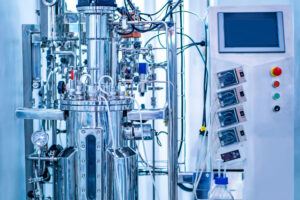Biocatalysis: Revolution in Sustainable Chemistry
Catalysis refers to the process by which chemical reactions occur faster, more energy-efficiently, or in a preferred direction. For more information, see Basic Information” What is catalysis?“.
A distinct area within catalysis is biocatalysis. Isolated enzymes or whole cells (in what is known as whole-cell biocatalysis) are used to accelerate and control chemical reactions.

Enzymes play essential roles in the metabolism of all organisms. They are typically composed of proteins and sometimes include a cofactor. As natural catalysts, enzymes enable numerous chemical reactions under mild conditions, such as low temperatures and normal pressure. This makes them particularly attractive for industrial applications.
In addition to isolated enzymes, scientists also use whole cells as biocatalysts. Enzymes typically catalyse only specific, single-step reactions. In whole-cell biocatalysis, enzymes function in their natural environment. Microorganisms, such as bacteria and unicellular organisms, are often employed in fermentation processes. Researchers optimize these microorganisms in various ways to ensure that the metabolic processes within the cells yield the desired product with high selectivity (i.e., without unwanted by-products).
A major advantage of biocatalysis is its high precision, resulting in products with high purity, often achieved in just a few reaction steps. This minimizes unwanted by-products, which would otherwise require extensive removal and disposal. Enzymes usually originate from biological, aqueous environments, which eliminates the need for harmful organic solvents or other chemicals in many processes. Enzymes or whole cells can replace organometallic catalysts in the production of fine chemicals. When transport metabolites or multiple enzymes are involved in the reactions, whole-cell biocatalysis becomes an effective and environmentally friendly method for producing these fine chemicals.
Biocatalysis has a long history. It has traditionally been used in the production of beer, wine, and cheese. More recently, the pharmaceutical industry has adopted biocatalysis for reactions that are impossible without catalysts or to replace processes requiring higher energy, critical reagents, or yielding lower outputs.
In the past, scientists isolated enzymes from microorganisms, plants, and animal extracts. Today, large bioreactors enable the production of the required enzymes on an industrial scale, for instance, in bacteria like Escherichia coli or yeasts like Saccharomyces cerevisiae. Moreover, enzymes can be tailored to meet industrial needs through rational design, based on detailed knowledge of their structure, or through directed evolution. Frances H. Arnold received the 2018 Nobel Prize in Chemistry for her work in this field. These approaches have made biocatalytic processes more efficient, environmentally friendly, and precise.
In industries such as food production, organic chemistry, and oleochemistry (the chemistry of fats), biocatalysis is used for applications such as the production of fragrances, flavourings, or in detergents. For instance, specific enzymes in detergents remove stains at low temperatures, contributing to environmental protection. Other examples include the production of vitamin C and aspartame, the conversion of starch into glucose syrup, and the manufacture of antibiotics through the cleavage of penicillin G. These processes benefit from the high precision and mild conditions offered by biocatalysis.
Over the past five years, advancements in protein science and structural biology have significantly accelerated the discovery and adaptation of new enzymes. Modern technologies such as machine learning and advanced screening methods have made enzyme customization for specific applications more efficient. Future applications include the breakdown of plastic waste and the creation of building blocks for new plastics through enzymes. Progress in data analysis, DNA technology, and the development of new enzyme families is expanding the toolkit of biocatalysis and making significant contributions to addressing global challenges.
Biocatalysis is making chemistry more environmentally friendly and efficient. Enzymes operate under mild conditions, such as low temperatures and normal pressure. Modern technologies now enable the customization and mass production of enzymes.
Further information:
- Buller R. et al. (2023), Science, 382, Issue 6673